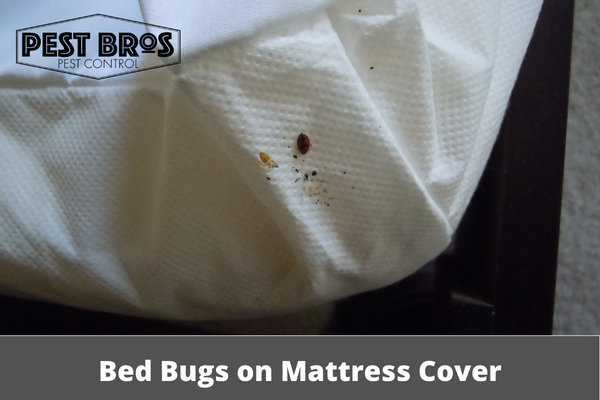Can You Still Get Bed Bugs With a Mattress Cover? Find Out!
Imagine this: you’ve invested in a high-quality mattress cover, believing it to be your ultimate shield against the dreaded bed bug invasion. You sleep soundly, comforted by the thought that you’re protected.
But then, a chilling question crosses your mind—can you still get bed bugs even with a mattress cover? This concern is more common than you might think, and it’s crucial to unravel the truth. Your peace of mind and a good night’s sleep hang in the balance.
You’re not just protecting your mattress; you’re safeguarding your home and health. Join us as we delve into the reality of mattress covers and bed bugs. Discover whether your protective layer is truly impenetrable or if there are gaps in your defense. By the end of this article, you’ll know exactly what steps to take to ensure your sanctuary remains undisturbed. Let’s uncover the truth together, and reclaim your comfort with confidence.
What Are Bed Bugs?
Bed bugs are tiny, wingless insects that feed on human blood. They are reddish-brown, oval-shaped, and about the size of an apple seed. These pests are notorious for their ability to hide and thrive in various environments. They have been around for centuries, causing discomfort and distress to many.
Bed bugs are hard to spot due to their small size and nocturnal nature. They are attracted to warmth and carbon dioxide, making humans ideal hosts. Their bites can cause itching and irritation, leading to sleepless nights.
Common Habitats
Bed bugs often find refuge in mattresses, bed frames, and box springs. They can also hide in furniture cracks, behind wallpaper, and under carpets. These pests prefer places where humans sleep or rest. They are adaptable and can thrive in clean or dirty environments. Hotels, apartments, and dormitories are common hotspots.
Bed bugs can travel easily from place to place. They latch onto luggage, clothing, and other personal items. This makes them a frequent nuisance for travelers. Identifying their hiding spots is crucial to prevent infestations.
Behavior And Feeding Patterns
Bed bugs are nocturnal feeders. They typically bite during the night while their hosts sleep. They use a small straw-like mouthpart to pierce the skin and drink blood. Feeding usually lasts for several minutes, often unnoticed by the host.
After feeding, bed bugs retreat to their hiding spots. They can survive for weeks without food, making them resilient pests. Their bites may not be immediately painful, but they can cause red, itchy welts. These pests are capable of multiplying quickly, leading to large infestations if not controlled.

Credit: doctorsniffs.com
Purpose Of Mattress Covers
Mattress covers serve an essential purpose in maintaining the cleanliness and longevity of your bed. They act as a barrier between your mattress and potential threats like dirt, spills, and pests. You might be wondering, can a mattress cover really keep bed bugs at bay? While it offers some level of protection, understanding its purpose is crucial in addressing this concern. Imagine investing in a comfortable mattress only to find it infested with bed bugs. A mattress cover can help prevent such a nightmare.
Types Of Mattress Covers
Mattress covers come in various types, each designed for specific needs. You’ll find options like waterproof covers, hypoallergenic covers, and encasements. Waterproof covers are ideal for protecting against accidental spills. Hypoallergenic covers are perfect if you’re sensitive to allergens. Encasements are designed to zip around your mattress completely, offering a higher level of protection against bed bugs. Knowing the differences helps you choose the right one for your situation.
Protection Against Allergens And Dust Mites
If you’re prone to allergies, mattress covers can be a lifesaver. They act as a shield against allergens like dust mites. Dust mites thrive in warm, humid environments, which your mattress can easily provide. A cover prevents them from settling into your mattress, reducing allergy symptoms. You might ask, how effective are they? Many people have reported fewer allergy flare-ups after using a hypoallergenic mattress cover. It’s a simple investment for a healthier sleep environment.
Effectiveness Against Bed Bugs
When battling bed bugs, the question often arises: can a mattress cover truly protect you from these persistent pests? The effectiveness of a mattress cover against bed bugs might not be as straightforward as you think. While these covers can be a significant part of your defense strategy, they are not a foolproof solution on their own.
How Mattress Covers Work
Mattress covers, often referred to as encasements, are designed to envelop your mattress entirely. This creates a barrier that bed bugs cannot penetrate. These covers are usually crafted from durable, tightly-woven fabric, ensuring no space for bed bugs to squeeze through.
By sealing off your mattress, these covers trap any bed bugs already inside, effectively cutting off their food source. This means any trapped bugs will eventually die. Additionally, encasements prevent new bed bugs from setting up a home in your mattress, providing a layer of protection.
Limitations And Potential Gaps
However, relying solely on a mattress cover might leave you vulnerable. Bed bugs are notorious for their ability to hide in tiny crevices beyond just your mattress. They can reside in bed frames, headboards, or even behind wallpaper, making a mattress cover just one piece of the puzzle.
Gaps in the encasement or improper installation can also render the cover ineffective. Even a small tear or an improperly zipped cover can allow bed bugs to escape or enter. Regular inspections are crucial to ensure the cover remains intact and secure.
Consider this: have you checked other potential hiding spots in your bedroom? A comprehensive approach, including regular cleaning and inspection of your sleeping area, is essential. While a mattress cover can significantly reduce risk, it should be part of a broader bed bug prevention strategy.
Signs Of Bed Bug Infestation
Bed bugs can invade your space, no matter the precautions. Even with a mattress cover, these pests might find their way into your home. Recognizing signs of bed bug infestation is crucial. Early detection helps in managing these unwelcome guests effectively.
Physical Symptoms
Bed bugs often leave traces on human skin. Look for red, itchy bumps on your body. These bites usually appear in a line or cluster. The itching can be severe and irritating. Scratching may lead to infection. Some people develop allergic reactions. These reactions can cause swelling and discomfort. Pay attention to any unusual skin changes.
Detecting Bed Bug Presence
Bed bugs leave physical evidence around sleeping areas. Check for small, rust-colored stains on sheets or mattresses. These stains result from crushed bugs or their excrement. Examine mattress seams and bed frames. Bed bugs hide in crevices and cracks. Use a flashlight to inspect dark corners. Look for tiny, dark spots or eggshells. Eggs are pale and small, resembling grains of rice. A musty odor might indicate a large infestation. The smell comes from the bugs’ scent glands.
Preventative Measures
When it comes to protecting your mattress from bed bugs, using a mattress cover is a smart first step. But is it enough? You might wonder if bed bugs can still invade your sleeping sanctuary despite this protective layer. The answer is yes, it’s possible. However, there are additional preventative measures you can take to enhance your defense against these pesky intruders. Let’s dive into some practical steps that can help keep your bedroom bed bug-free.
Additional Protective Steps
A mattress cover is just one piece of the puzzle. Consider sealing your pillows and box springs with covers too. These areas can also harbor bed bugs. Additionally, keep your bedroom clutter-free. Bed bugs love hiding in piles of clothes and other items. Vacuum your floors and furniture regularly. This helps eliminate any bugs trying to settle in.
Do you travel often? Bed bugs are notorious hitchhikers. When returning home, inspect your luggage carefully. Unpack in a separate area from your bedroom. This minimizes the risk of transferring any unwanted guests to your sleeping space.
Routine Checks And Maintenance
A mattress cover works best when paired with routine checks. Inspect the seams and folds of your mattress and furniture. Bed bugs can hide in the smallest of crevices. Look for signs like small reddish stains or tiny black spots. These could indicate bed bug activity.
Regular maintenance of your bedroom is key. Wash your bedding in hot water at least once a week. This kills any bugs that might have made it past your defenses. Consider using a steam cleaner on your mattress occasionally. The heat effectively kills bed bugs and their eggs.
Have you found any bed bugs during your checks? Act quickly to prevent an infestation. There are effective DIY treatments available, or you might choose to call a professional. Address the problem immediately to avoid bigger issues down the road.
Can a mattress cover alone keep you safe from bed bugs? Not entirely. But with these preventative measures, you can significantly reduce your risk. What steps will you take to protect your bedroom? Keep these insights in mind and sleep peacefully knowing you’ve done your part to keep bed bugs at bay.
Choosing The Right Mattress Cover
Mattress covers can reduce bed bug risks, but they don’t guarantee complete protection. Bed bugs can still invade other bedroom areas. Ensure the cover fits snugly and inspect for tears regularly to maintain its effectiveness.
Choosing the right mattress cover can be a crucial step in protecting your bed from bed bugs. Not all covers offer the same level of protection. Knowing which features to look for can make a big difference in ensuring your bed remains bug-free. A well-chosen mattress cover can act as a barrier, preventing bed bugs from reaching your mattress and offering peace of mind for a restful night’s sleep.Features To Consider
When selecting a mattress cover, certain features are essential. Look for covers labeled as bed bug-proof. These usually have tightly woven fabric. The cover should completely encase the mattress. A secure zipper is crucial, as bed bugs are tiny and can slip through gaps. Ensure the cover is durable and tear-resistant. Opt for a breathable material to maintain comfort. Waterproof covers can provide extra protection against spills and stains.Comparing Popular Brands
Different brands offer various features and price points. Linenspa provides affordable options with basic protection. SafeRest focuses on hypoallergenic materials, ideal for sensitive skin. Sleep Defense System offers covers with reinforced zippers for added security. Each brand has unique strengths. Consider what features matter most to you. Reviews can offer insights into user experiences.What To Do If You Have Bed Bugs
Discovering bed bugs in your home can be alarming. Even with a mattress cover, these pests can find ways to invade. Knowing what to do is crucial for peace of mind. Address the issue promptly to prevent spreading. Here’s how to tackle a bed bug problem effectively.
Immediate Actions
First, strip your bed immediately. Wash all bedding in hot water. Heat kills bed bugs. Dry them on high heat to ensure all bugs are gone. Vacuum your mattress and surrounding areas thoroughly. Use a vacuum with a HEPA filter. Dispose of the vacuum contents in a sealed bag.
Inspect other areas of your home. Bed bugs can hide in cracks and crevices. Check furniture, baseboards, and even electrical outlets. Seal any cracks to prevent further hiding spots. Consider using bed bug interceptors under bed legs. These traps catch bugs trying to climb up.
Professional Pest Control Options
If the infestation persists, seek professional help. Pest control experts have specialized tools. They can assess the extent of the infestation. Professionals use safe, effective treatments. They ensure all bed bugs are eliminated.
Request a consultation to understand treatment options. Some companies offer heat treatments. Others use safe insecticides. Choose a method that suits your needs. Ensure the pest control company is reputable. Read reviews and ask for references.
Regular inspections can prevent future infestations. Maintain good hygiene practices. Keep your home clutter-free. This reduces hiding spots for bed bugs. Stay vigilant and address any new signs of infestation quickly.

Credit: dec.alaska.gov

Credit: www.orkin.com
Frequently Asked Questions
Do Mattress Covers Prevent Bed Bugs Entirely?
Mattress covers can deter bed bugs but not eliminate them completely. They act as a barrier, making it harder for bed bugs to infest. However, bed bugs can still hide in other areas, so regular inspections and cleanliness are essential to prevent infestations.
Can Bed Bugs Live On Mattress Covers?
Bed bugs cannot live on mattress covers as they don’t provide a suitable habitat. They prefer to hide in cracks and crevices, close to their food source. Mattress covers can help trap existing bed bugs, preventing them from spreading further.
How Effective Are Encasements Against Bed Bugs?
Encasements are highly effective at protecting mattresses from bed bugs. They seal the mattress, preventing bugs from entering or escaping. This containment aids in controlling infestations, but it’s crucial to treat other areas as well for comprehensive protection.
Should I Clean My Mattress Cover Regularly?
Yes, cleaning your mattress cover is essential to maintain hygiene and prevent bed bugs. Regular washing removes dirt, allergens, and any potential bed bugs. Follow the manufacturer’s instructions for cleaning to ensure the cover remains effective.
Conclusion
Protecting your sleep space requires more than just a mattress cover. Bed bugs can still find their way onto your bed. Regular checks help keep them away. Cleaning your room is also crucial. Vacuum often and wash bedding in hot water.
Declutter your space to limit hiding spots for bed bugs. Don’t rely solely on a mattress cover for protection. Stay proactive and keep your bedroom clean. Simple steps can make a big difference. Your comfort and peace of mind depend on it.
Stay vigilant and rest easy.


